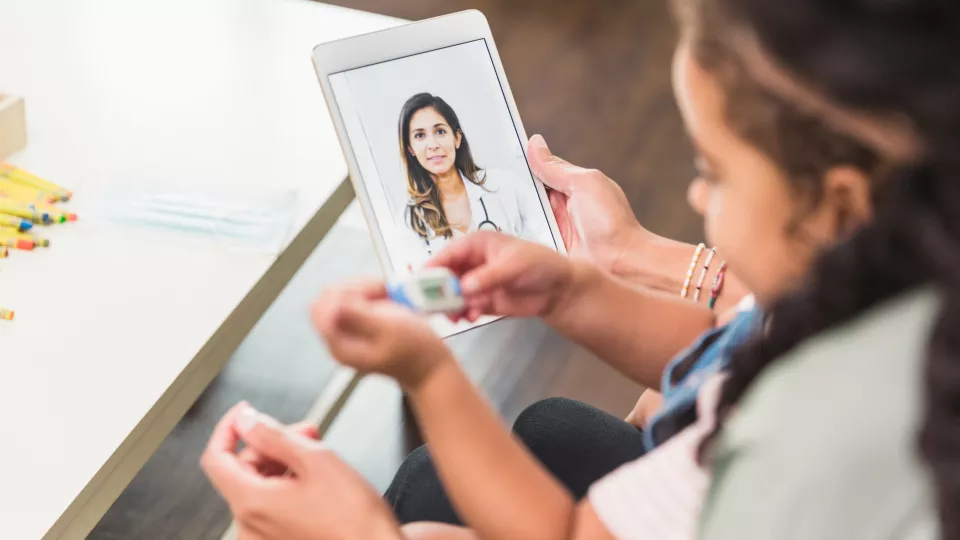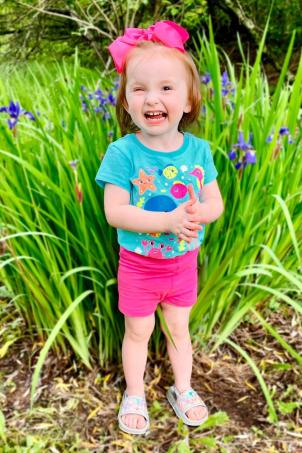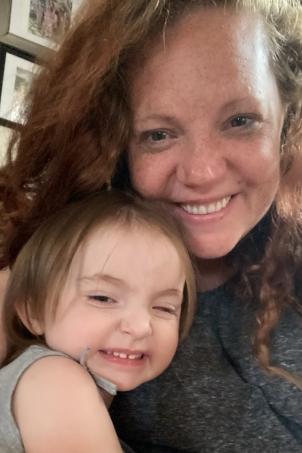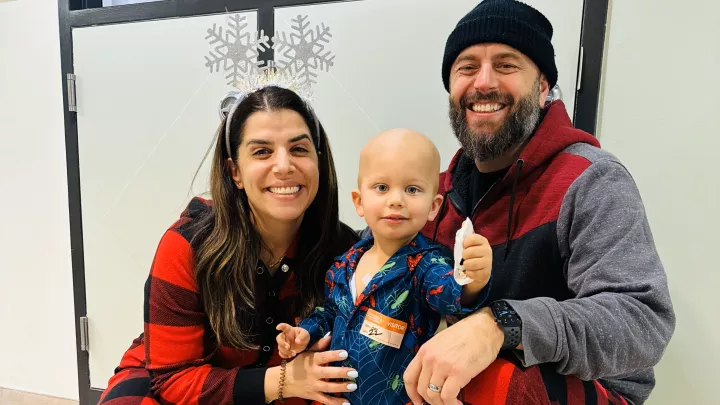
Online Second Opinion Provides Peace of Mind for Families
Jeannie describes 2-year-old Isabelle as a typical toddler. She’s into everything and loves playing with her three older sisters. But this wasn’t always the case.
When Isabelle was 14 months old, Jeannie noticed a film-like substance covering her right eye. “Sometimes, when we were out in the sun or the light caught her eye in a specific way, I saw something that looked like it shouldn’t be there,” she says. “It reminded me of cataracts.”
Multiple doctor visits uncover an alarming diagnosis

Curious to know more, Jeannie brought Isabelle to their local pediatrician in rural Virginia. The pediatrician wasn’t sure what could be wrong and referred her to a local eye care provider. Initial testing showed nothing wrong. About a month later, Isabelle’s eye started turning outward.
Jeannie brought Isabelle to a pediatric ophthalmologist about two hours from where they lived. The specialist quickly identified the issue as retinoblastoma, a cancer that starts in the back of the eye (retina). Jeannie was in shock. “I don’t remember driving home from that appointment,” she says.
A rare cancer requiring life-changing treatment
Retinoblastoma is rare, and without treatment, it can lead to blindness or even death. Furthermore, few pediatric ophthalmologists have experience treating it. Jeannie was worried that she was running out of options.
The local specialist referred Isabelle to an academic medical center about three hours from their home. Fortunately, the ocular oncologist there had more retinoblastoma experience. After meeting with them, Jeannie was confident in their ability to help her child. But there was a catch: The treatment that could save Isabelle’s life involved removing the affected eye (enucleation).
Is this the right treatment for my child?
On paper, enucleation sounded like a logical decision. But Jeannie was torn. “We’re talking about my youngest daughter. My baby.” Was surgically removing an eye at such a young age the right move?
Jeannie had a big decision to make. She was leaning toward enucleation but wanted another opinion. She had already exhausted all of her options locally—there wasn’t another ocular oncologist to turn to. Fortunately, a mom from Hawaii in an online pediatric retinoblastoma support group shared her positive experiences with Jesse Berry, MD, Director of Ocular Oncology and the Retinoblastoma Program at Children’s Hospital Los Angeles.
Experts from CHLA’s world-renowned Retinoblastoma Program have helped develop several innovative diagnostic and treatment methods. The hospital also leads research that continues to advance the field. This depth of experience ensures more children like Isabelle have access to evidence-based, personalized care.
Prompt Online Second Opinion Provides Much-Needed Answers
Jeannie was grateful for the provider recommendation—but as a busy mom of four on the East Coast, an in-person visit was not possible. Fortunately, traveling to see Dr. Berry wasn’t necessary. CHLA’s Online Second Opinion program enabled Jeannie to receive recommendations tailored to Isabelle’s needs from the comfort of their home.
Jeannie sent Isabelle’s medical records, and within a few days, she and Isabelle’s doctor spoke with Dr. Berry via virtual consultation. They discussed how there were actually two tumors in Isabelle’s eye. The second one was attached to the optic nerve—meaning a higher risk to Isabelle, and a lower likelihood of retaining any useful vision in the eye even if it was preserved. Dr. Berry agreed with the previous ocular oncologist’s recommendation to remove the eye.

An Excellent Experience
The recommendation to enucleate was difficult for Jeannie to hear, but it provided peace of mind that this procedure was the best option for Isabelle. “Hearing from a doctor outside of where I had been going who could provide a fresh perspective sealed the deal.”
Isabelle had her enucleation and is back to her spunky self and enjoying time with her family.
When asked about her experience with CHLA, Jeannie gave an enthusiastic thumbs up. “I’ve told everyone I know about this. Dr. Berry was awesome and I have recommended the Online Second Opinion program to other families,” she said. “Dr. Berry answered every single question I had and made the information easy to understand. It worked out great for us.”


